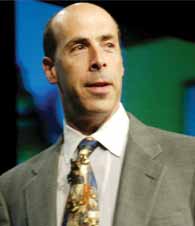|
Executive Interviews: Interview with Rob Jolles on Executive Development
October 2007
-
By Dr. Nagendra V Chowdary
 Rob Jolles
Rob Jolles President of Jolles Associates Inc., speaker and author 
-
What according to you is the best
way of executing executive
development/education programs;
should they be inhouse as per a
pre determined curricula (based on
the gap analysis); should they (the
chosen executives) be sponsored for
a sabbatical in a relevant institution;
or should they be coached and
mentored on a longer time horizon,
within the organization?
I think I addressed this in the
previous question. The best way to
execute executive development is to
take the training to a professional
not someone who self published a
book, but someone with real credibility, a real following, and a real
track record.
|
|
I do not say this because
it is my profession.I say this because
ultimately it will be the least
expensive alternative,and the most
successful alternative. Appreciated
training, effective training, a
motivated audience, and information
that is implemented into the culture
of the company is a win for everyone.
-
Leading a turnaround,
stimulating a stagnant business,
influencing a company's longstanding
direction, etc., are some of
the oft needed skills as the
managers cruise in their careers.
Can these very important skills be
impar ted through executive
development programs?
Absolutely. And it is critical because
typically a manager becomes a
manager not because he manages
people well, but hemanages himself
well. Once he exceeds the
company's expectations of him, he
magically becomes a manager. An
entirely new set of skills are needed
and they are not necessarily
instinctive. That's where the
executive development programs
come in, and properly delivered,
they are invaluable. -
Are there any expected
deliverables at the end of any
executive development program?
Given the "voluntary" nature of
these programs, do you think it's
reasonable to expect the rigor and
seriousness in these programs?
An expected deliverable tomewould
be a combination of role plays and
case studies. That means real world
practice using the skills that were
taught. What's more, an expected
deliverable tome would be an action
plan that is monitored showing how
the skills taughtwill be used over the
next 306090 day period. -
Many a times companies attempt
to realize the same deliverables by
giving their executives "self help"
books. Do you think formal
classroom learning would provide
an enriching and effective learning
platform compared to "self help"
learning?
To be kind, self help books have a
place in training. The problem is
we have to make sure we are using
the right term here. Self help books
must never be confused with
training or development. These
books cannot interact, facilitate,
answer specific questions, or apply
themselves to an exact scenario.
However, I like self help books as a
folcelebratlow up to training. Once
a participant goes through training,
these books can be a first attempt at
incor porating follow up. It might
be interesting to note that I will
never allow clients of mine to read
any of my books before training.
Many will not read the book fully,
and they will lose the ability to
discover things that would be more
meaningful with a group. But what
a wonderful way to f inish a
development program. If the
program the participant completed
was the best training program they
ever attended, I can assure you they
will read the book! Can you please share with our
readers your experiences in
designing and delivering executive
development programs? And more
so in "executing strategic change"
program? What is the profile of
participants? What are their
expectations and what are end ofthe
program deliverables?
I would seriously encourage your
readers to read my book for the
answer to this question. It would
take a book to answer it. However,
let me provide you with a couple of
sentences. When designing a
program, I would tell your readers to remember interaction,
facilitation, real world case studies
and generally participation are
more important than volumes of
material. There is no real profile
for participants because it depends
on the program. There is no generic
participant because all individuals
can benefit from development. Drawing from Stanford's
experience in delivering one of the
best executive development
programs, what trends have you
noticed in the last decade or so?
What is your assessment of the
future potential of this space?
Sadly, in the US, I think we are
moving backwards, and not
forwards. The trend here has been
to allow the economy to dictate
development opportunities. In
other words, when the economy is
strong, companies like to spend
money on development. When the
economy weakens, companies cut
back. Ironically, that 's when
companies need these
development opportunities the
most. When it comes to executive
development, should companies be
proactive or should that choice be
individual driven? Can executive
development programs be looked
upon as a powerful talent retention
tool?
Companies should be proactive.
Most individuals, particularly
sales people who I specialize in
working with, will not always
seek development opportunities.
It requires a sacrifice in time and
is often put off unless directed by
the company. What is the role of leadership in
executive development?
I think the role of leadership in
executive development is critical.
The question is, can true
leadership be taught? I've seen
many who want to be leaders, but
cannot inspire and lead those
around them. I'm not sure a taught
process can address this.
1.
Training and Development Case Studies
2. ICMR
Case Collection
3.
Case Study Volumes
|
